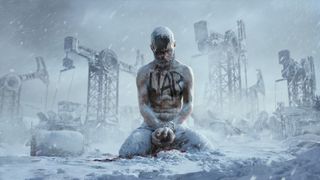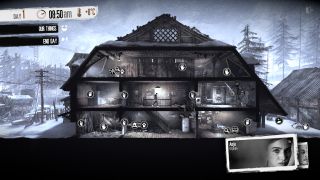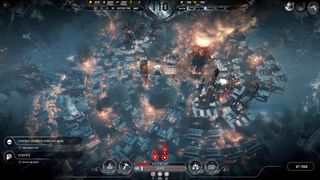How the creators of Frostpunk and This War of Mine embraced 'dead serious' games
Ditching The Witcher for war and famine.

This article first appeared in PC Gamer magazine issue 363 in November 2021, as part of our 'Positive Influence' series, where every month we chat to a different developer about the inspirations and unexpected connections behind their work.
For many game developers, becoming a quest designer on the Witcher series would be a dream come true. For Pawel Miechowski, however, it was a sign he was in the wrong place. The Polish writer had been working on a smaller project, which was cancelled as CD Projekt piled as many bodies as it could onto the franchise that would make its name.
"I'm a big fan of The Witcher, but being a quest designer is totally not my thing," he says. "I felt kind of lost. I decided to quit." A bunch of Miechowski's friends found themselves in a similar boat, and quickly founded 11 Bit Studios. "Bits are always even, 2-bit, 4-bit, 8-bit," Miechowski points out. "Beginning with the name, we wanted to make unconventional connections."
That approach was borne out in the studio's first few games, built from an apartment in Warsaw. The Anomaly series technically belonged to the tower offence genre, since it gave you control of the attackers, not the defenders. And on mobile, 11 Bit released Sleepwalker's Journey, a platformer where you played the platform, as well as Funky Smugglers – a variant on Fruit Ninja in which you were swiping contraband from '70s-styled passengers as they passed through an airport x-ray machine. But the studio made its most strikingly unconventional connection in 2014 – when it paired The Sims with a humanitarian crisis in This War of Mine.
11 Bit's founders, by this point nearing 40 and playing The Last of Us, were ready to treat gamers as a mature audience. "We as players required that from games," Miechowski says. "That was really a breakthrough moment, like combustion."

Miechowski's brother Grzegorz, then CEO of the company, pulled inspiration from the articles he'd been reading about the Bosnian War, and specifically the siege of Sarajevo. "Let's make a game about civilians trying to survive war," he said, "with all the harsh consequences of those decisions. A dead serious game."
Get serious
At GDC, Miechowski spoke to Lucas Pope, the maker of the similarly heavy Papers, Please. And as development of This War of Mine continued, the Russo-Ukrainian War unfolded on 11 Bit's doorstep, providing a sobering reminder of just how quickly order could break down. "If you think that the civilised world would never collapse, well: it's our neighbouring country, a few hundred kilometres from where I live," Miechowski says.
Among the survivors of This War of Mine were an ageing teacher, now simply a burden, and a professional footballer, whose fame counted for naught once conflict took over. "We did it on purpose," Miechowski says. "Most of our skills would be useless in war. What counts is survival skills, cooking, fighting, but also one man helping another. You learn from your grandfathers who lived during the Second World War. They have real experiences, we can listen to them and learn."
The biggest gaming news, reviews and hardware deals
Keep up to date with the most important stories and the best deals, as picked by the PC Gamer team.

This War of Mine was a huge success. One fan, the award-winning Polish author Lukasz Orbitowski, wrote a novel off the back of it – which in turn inspired a storydriven DLC pack called Father's Promise. The experiment led to another collaboration, with 80 Days lead writer Meg Jayanth, on the Last Broadcast DLC – in which a disabled radio DJ decides whether or not to spare listeners the truth about news in their city, in order to prevent widespread panic. "What we were trying to achieve was to show very different perspectives," Miechowski says.
Around the same time, marketing director (and now game director) Patryk Grzeszczuk pushed 11 Bit to codify its new philosophy. Today, the studio calls its work ‘meaningful entertainment', a mantra that has led directly to Frostpunk and its upcoming sequel. Like This War of Mine, they're management games about surviving a hostile environment by huddling together and making hard choices. In fact, in Frostpunk, even the buildings seem to huddle - clustering around a central furnace that represents warmth and hope, even as it burns to embers.
"Everything comes from the idea," Miechowski says. "In Frostpunk 2, we want to focus on the conflict between humans and human nature, between the cold and human values. From there comes the story and all the gameplay systems – they need to be like cogs in a good machine."

If you love big trucks, establishing trade routes, and the phrase 'post-apocalyptic survival business simulator' then I've got just the strategy RPG for you

Blizzard veteran David Kim's strategy comeback with Battle Aces is 'very personal:' 'I just can't accept... the end-all peak of RTS is StarCraft 2 and nothing can ever be better'
Most Popular


